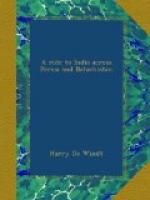It was dusk, and we had just secured the only horses available, when two Armenians, bound for Teheran, rode into the yard. When told they were just too late for a relay, the rage of one of them—a short, apoplectic-looking little man—was awful to behold. As I mounted, his companion came up and politely advised us not to attempt to ride to Murchakhar by night. “The road swarms with footpads,” he said, in a mysterious undertone; “you run a very great risk of being robbed and murdered if you go on to-night.” “You would have run a far greater of being frozen to death, if we had not saved you by taking these horses,” cried Gerome, as we rode coolly out of the gateway.
Bideshk is noted for a great battle fought in its vicinity between the army of Nadir Shah and Ashraf the Afghan. Its post-house is also noted, as I can vouch for, for the largest and most venomous bugs between Teheran and Ispahan. We only remained there three hours, and felt the effects for days afterwards.
All trace of ice and snow disappeared a few farsakhs from here, and we galloped gaily across a hard and level plain to our destination for the night. The post-house was a blaze of light. A couple of armed sentries stood in front of the doorway, and a motley crowd of soldiers, Shagird-chapars, and peasants outside.
“You cannot come in,” said the postmaster, full of importance. “The Zil-i-Sultan is here on a hunting expedition. He will start away early in the morning, and then you can have the guest-room, but not before.” Too tired to mind much—indeed, half asleep already—we groped our way to the stables, where, on the cleanest bundle of straw I have ever seen—or smelt, for it was pitch dark—in a Persian post-stable (probably the property of his Highness the Governor of Ispahan), we were soon in the land of dreams. Had we known that we were calmly reposing within a couple of feet of the royal charger’s heels, our slumbers might not have been so refreshing. Daylight disclosed the fact.
The governor and his suite had apparently made a night of it. Although it was past eight o’clock when we made a start, the prince, his suite, soldiers, and grooms were none of them stirring, although his chef was busily engaged, with his staff of assistants, preparing a sumptuous breakfast of kababs, roast meat and poultry, pastry, and confectionery of various kinds. I could not help envying the man whose appetite and digestion would enable him to sit down to such a meal at such an hour. Sherbet, the Shagird from Murchakhar informed us in confidence, is the favourite drink of the Zil-i-Sultan. I only once tasted sherbet in Persia, and was somewhat surprised—so lasting are one’s youthful associations—to find it utterly different to the refreshing but somewhat depressing beverage of my school-days, sold, if I remember rightly, at twopence a packet. The real sherbet I was given (in a native house at Shiraz) consisted simply of a




